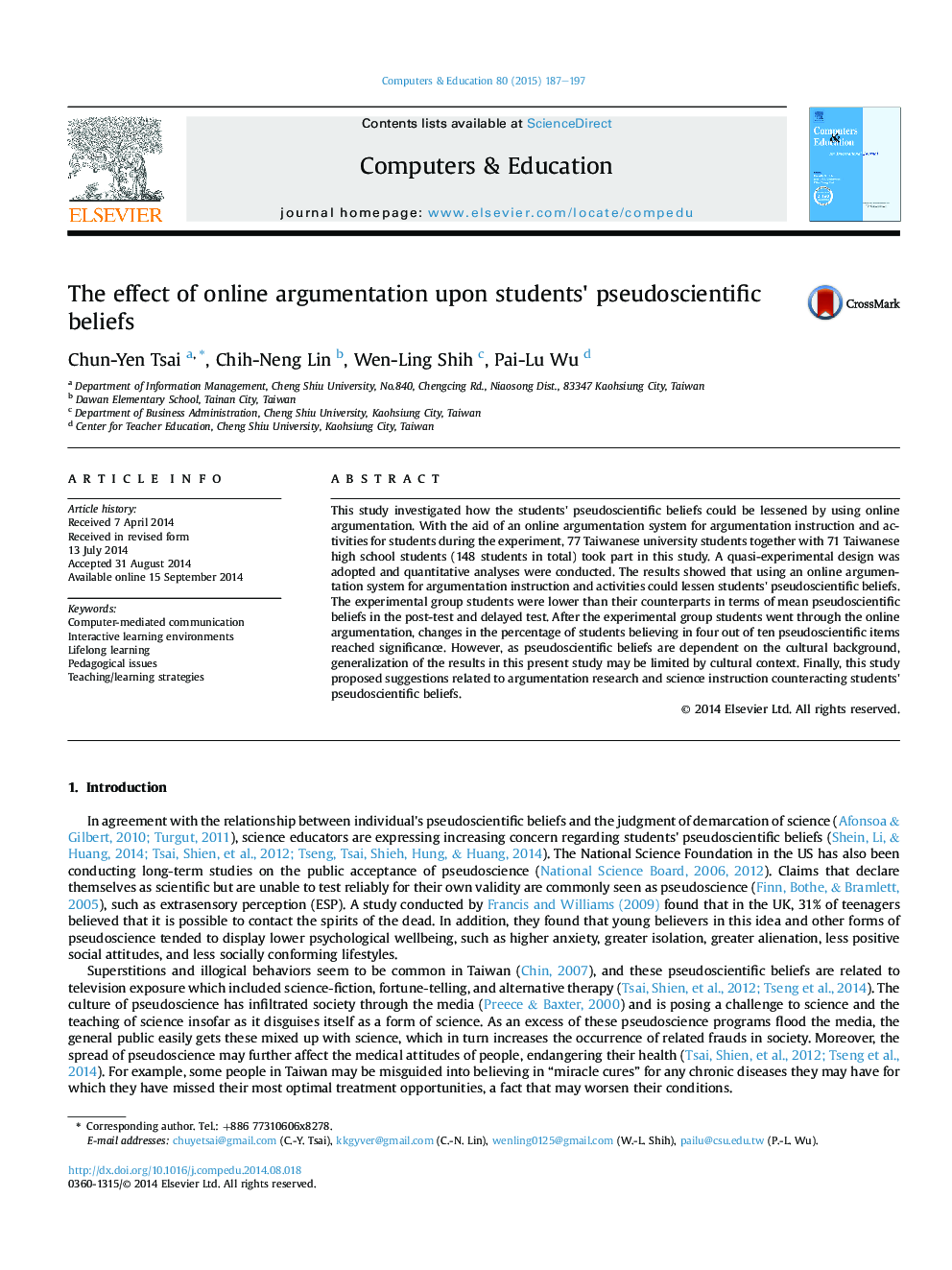| کد مقاله | کد نشریه | سال انتشار | مقاله انگلیسی | نسخه تمام متن |
|---|---|---|---|---|
| 6835114 | 618177 | 2015 | 11 صفحه PDF | دانلود رایگان |
عنوان انگلیسی مقاله ISI
The effect of online argumentation upon students' pseudoscientific beliefs
ترجمه فارسی عنوان
تأثیر استدلال آنلاین بر باورهای شبه علمی دانش آموزان
دانلود مقاله + سفارش ترجمه
دانلود مقاله ISI انگلیسی
رایگان برای ایرانیان
کلمات کلیدی
ارتباطات با واسطه کامپیوتر، محیط یادگیری تعاملی، یادگیری مادام العمر، مسائل آموزشی استراتژی های آموزشی / یادگیری،
ترجمه چکیده
این مطالعه به بررسی اینکه چگونه اعتقادات شبه علمی دانش آموزان می تواند با استفاده از استدلال آنلاین کاهش یابد. با کمک یک سیستم استدلال آنلاین برای آموزش استدلال و فعالیت ها برای دانش آموزان در طول آزمایش، 77 دانشجوی دانشگاه تایوانی همراه با 71 دانش آموز دبیرستان تایوانی (مجموع 148 دانش آموز) در این مطالعه شرکت کردند. یک طرح نیمه تجربی به تصویب رسید و تجزیه و تحلیل کمی انجام شد. نتایج نشان داد که استفاده از سیستم استدلال آنلاین برای آموزش استدلال و فعالیت ها می تواند اعتقادات شبه علمی دانش آموزان را کاهش دهد. دانش آموزان گروه تجربی کمتر از همتایانشان از لحاظ متوسط اعتقادات شبه علمی در آزمون های پس آزمون و تاخیر بودند. پس از آنکه دانشجویان گروه آزمایشی از طریق استدلال آنلاین پی بردند، تغییرات در درصد دانشجویان معتقد به چهار مورد از 10 مورد شبه علم شناختی به اهمیت رسید. با این حال، به عنوان اعتقادات شبه علمی وابسته به پس زمینه فرهنگی، تعمیم نتایج در این مطالعه حاضر ممکن است توسط زمینه های فرهنگی محدود شده است. در نهایت، این مطالعه پیشنهادات مربوط به تحقیق استدلال و دستورالعمل علمی را در مقابل باورهای شبه علمی دانش آموزان ارائه داد.
موضوعات مرتبط
علوم انسانی و اجتماعی
علوم اجتماعی
آموزش
چکیده انگلیسی
This study investigated how the students' pseudoscientific beliefs could be lessened by using online argumentation. With the aid of an online argumentation system for argumentation instruction and activities for students during the experiment, 77 Taiwanese university students together with 71 Taiwanese high school students (148 students in total) took part in this study. A quasi-experimental design was adopted and quantitative analyses were conducted. The results showed that using an online argumentation system for argumentation instruction and activities could lessen students' pseudoscientific beliefs. The experimental group students were lower than their counterparts in terms of mean pseudoscientific beliefs in the post-test and delayed test. After the experimental group students went through the online argumentation, changes in the percentage of students believing in four out of ten pseudoscientific items reached significance. However, as pseudoscientific beliefs are dependent on the cultural background, generalization of the results in this present study may be limited by cultural context. Finally, this study proposed suggestions related to argumentation research and science instruction counteracting students' pseudoscientific beliefs.
ناشر
Database: Elsevier - ScienceDirect (ساینس دایرکت)
Journal: Computers & Education - Volume 80, January 2015, Pages 187-197
Journal: Computers & Education - Volume 80, January 2015, Pages 187-197
نویسندگان
Chun-Yen Tsai, Chih-Neng Lin, Wen-Ling Shih, Pai-Lu Wu,
